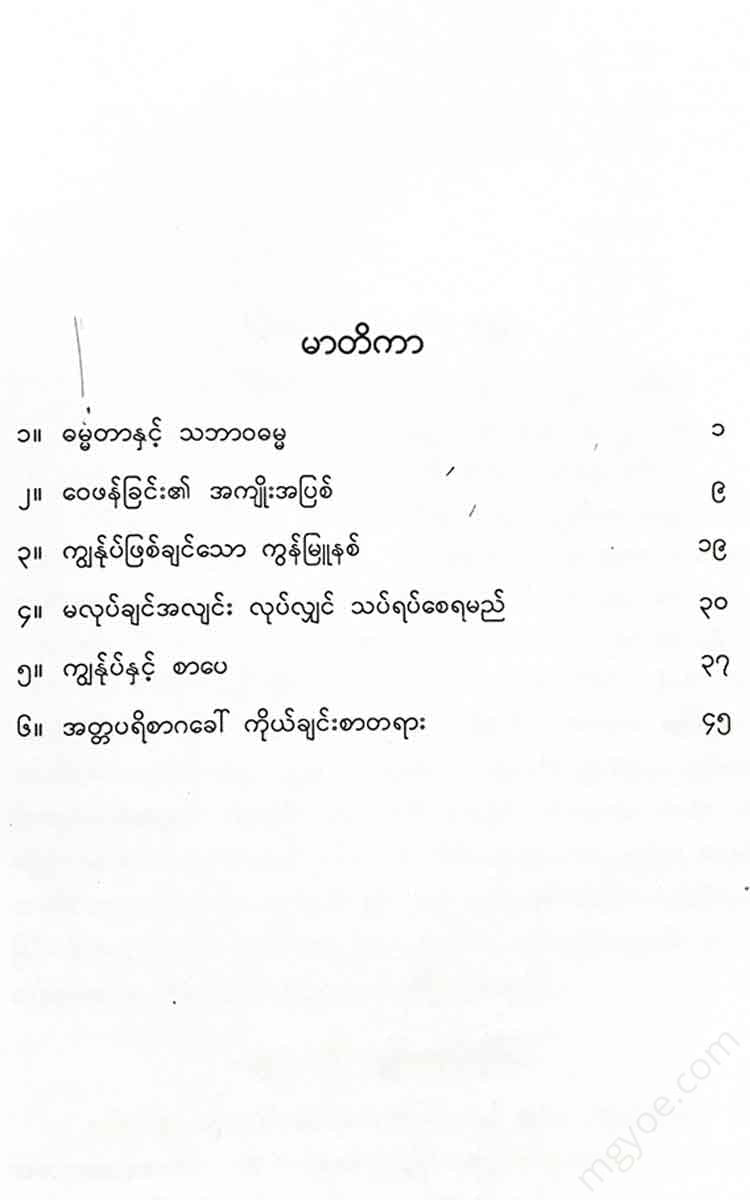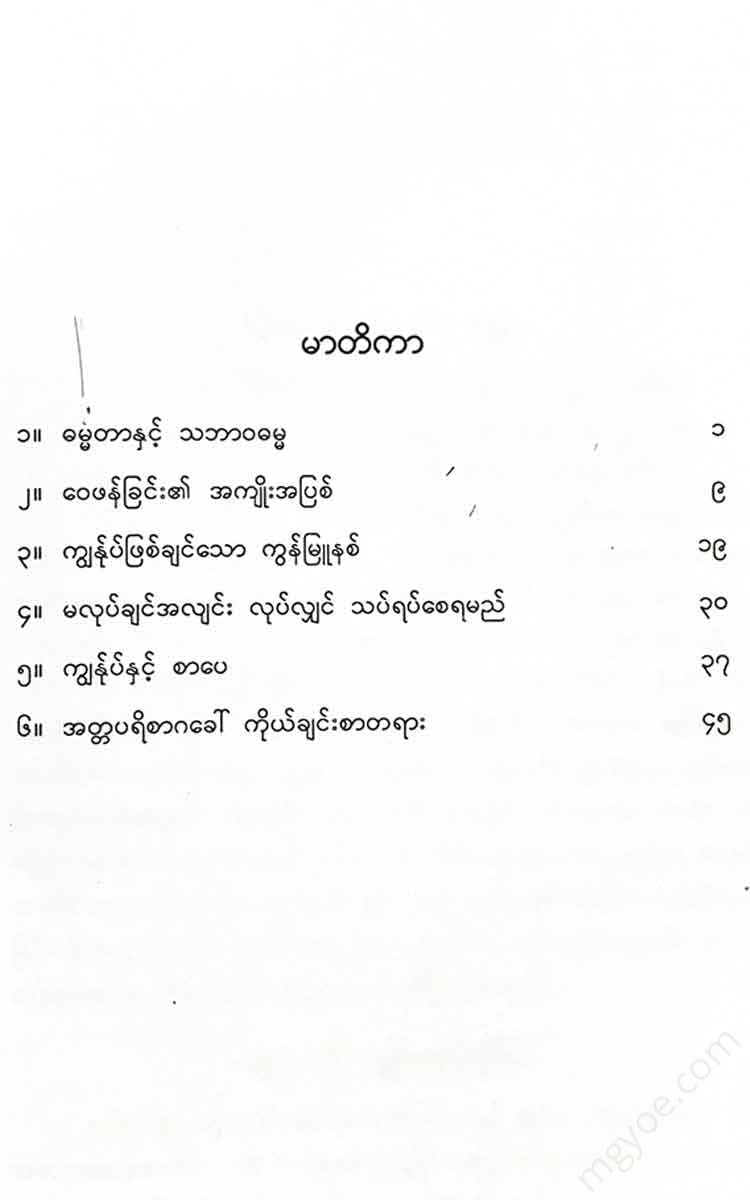စိတ်ကူးချိုချိုစာပေ
Golden Peacock - Dharma and Nature
Golden Peacock - Dharma and Nature
Couldn't load pickup availability
Dharma and natural dharma,
Only by striving to transcend the Dharma will progress be possible. The practice of turning inward and looking within oneself can lead to Nibbana, both in the world and in the world.
Human Nature is understood as the disposition and habits of human beings. Natural Law is understood as the laws and regulations governing all things. Self-love (and therefore selfishness), a man loving a woman and a woman loving a man, etc., are human nature (the nature of beings). The Dhamma protects those who observe the Dhamma (dhammohaveirakkati, dhammasari) should be called natural law. Human nature is not something that cannot be transcended, and (in some cases) only when it can be transcended can one see the benefits. Natural Law is understood as something that no being can transcend.
The need to transcend the norm
To be clear, self-love is a dharma (norm), and it is not unusual to act selfishly in accordance with this attitude, but they understand that a person who acts in this way cannot be a good person, and they try to overcome it. All evil deeds such as killing and stealing are rooted in the concept of self-love, while sensual acts such as giving and observing the precepts are based on the concept of renunciation of self. In short, all sensual acts are simply selfishness, and sensual acts are simply renunciation of self. By supporting this, it is necessary to oppose the dharma principle. If one can oppose it, it means that it is beneficial for oneself.
Waiting outside
There is no natural tendency for a being to look at itself (inwardly), but rather to look at others (outwardly). In this respect, natural law also helps. For example, the two eyes are turned outward, and are prepared to look outward (at others). The two ears are turned outward, as if they were intended to listen to sounds from outside. In the same way, the nose, tongue, and body are also turned outward, as if they were intended to receive attention from outside. Therefore, it is not only natural for a being to want to criticize others without examining himself, but also natural law helps.
Blaming others
Acting according to the Dharma is like being swept away by the current. Those who want to mature in virtue or progress must strive to transcend the Dharma (norm) like a person who swims in the current. Out of a hundred people, what percentage do you think there are people who are in the habit of criticizing themselves without looking at the faults of others? A bad Dharma is also one who, when examining another person, does not easily see the good points of that person and sees only the faults first. Just as when examining an acquaintance, the faults of that person appear clearly, the good points do not suddenly appear, but only after a little thought. This is Dharma.
Sri Lankan guru Roberts
There are many people who think of themselves as roughly estimated. Those who make a habit of relentlessly examining themselves and finding fault with them are very rare. Even though they may be self-critical, fewer still are able to find fault. It is difficult for human beings to see themselves as they really are. That is why the Scottish poet Robert Burns once wrote, “Would that we could see ourselves as others see us.”
His opinion and mine
What the great sage meant was that it is very difficult for a human being to see himself as others see him. Yes, it is. The way he sees himself is one thing, and the way others see him is only one thing. In this case, his own judgment of himself is often higher than the judgment of others. It happens that if a person thinks that he is a person of one hundred thousand, other people may think that he is as good as fifty thousand. Therefore, if someone wants to know how others judge him, he should reduce his own estimate by two or three. In other words, if he thinks that he is a person of one hundred thousand, good, or good, then he should reduce it by at least half, and then he will be able to judge the estimate of other people.
Knowledgeable and good people
Here we must distinguish between a good person, or a skilled person, and a good person. A good person means a quality of expertise and understanding, while a good person means good morals. Skill and skill are (the work of the brain) including knowledge, intelligence, thinking, and management, while goodness means a good heart with compassion. My conclusion is that you cannot become a good person just by not drinking alcohol.
Leafy fruit
In matters of excellence or ability and goodness, we must speak of the judgments of others and our own judgments. When our judgments differ from those of others in matters of excellence, we generally do not assume that others' judgments are always correct, even if they are correct. There are "successful" people in this area and in that area. However, it is also possible that others do not think that we are good, so we are in the dark.
2 reasons for fame
Being famous is another thing, being known as much as you can. Being famous, or being well-known, is a kind of reward. Being famous can be due to past karma (called parampara). It can also be due to being famous in this life. Some people with past karma have become famous without trying, and some are even more famous than they really are. There are also people who have become famous and famous because they have done it themselves, even though they have no past karma. The way to do it is like a person who wants to sell a product, who makes people know the good things about that product (Salesmanship) . Just as a marketer needs to be educated, so a person who wants to be famous can make people see that fact if he has good information. If he does not do it or does not want to do it, he will not be famous, However, if you want to do something but don't do it properly, you will only be known as a "stupid person".
You shouldn't be subject to other people's judgments.
When it comes to the quality of being good or talented, when your own judgment differs from that of others, it is said that your own judgment may be correct or not, but that is not the case when it comes to whether you are a good person or not. For me, there are places where I accept other people's judgments about being good or talented. There are places where I do not accept them. If someone points out my shortcomings in writing, translating, etc., I am ready to accept them. However, since I have personally experienced the articles I have written about the nature of the mind, no one can accept them. (There may be many mistakes, but I just mean that I cannot accept them. It is natural to not accept criticism in cases where you have tested them and think they are certain. However,







